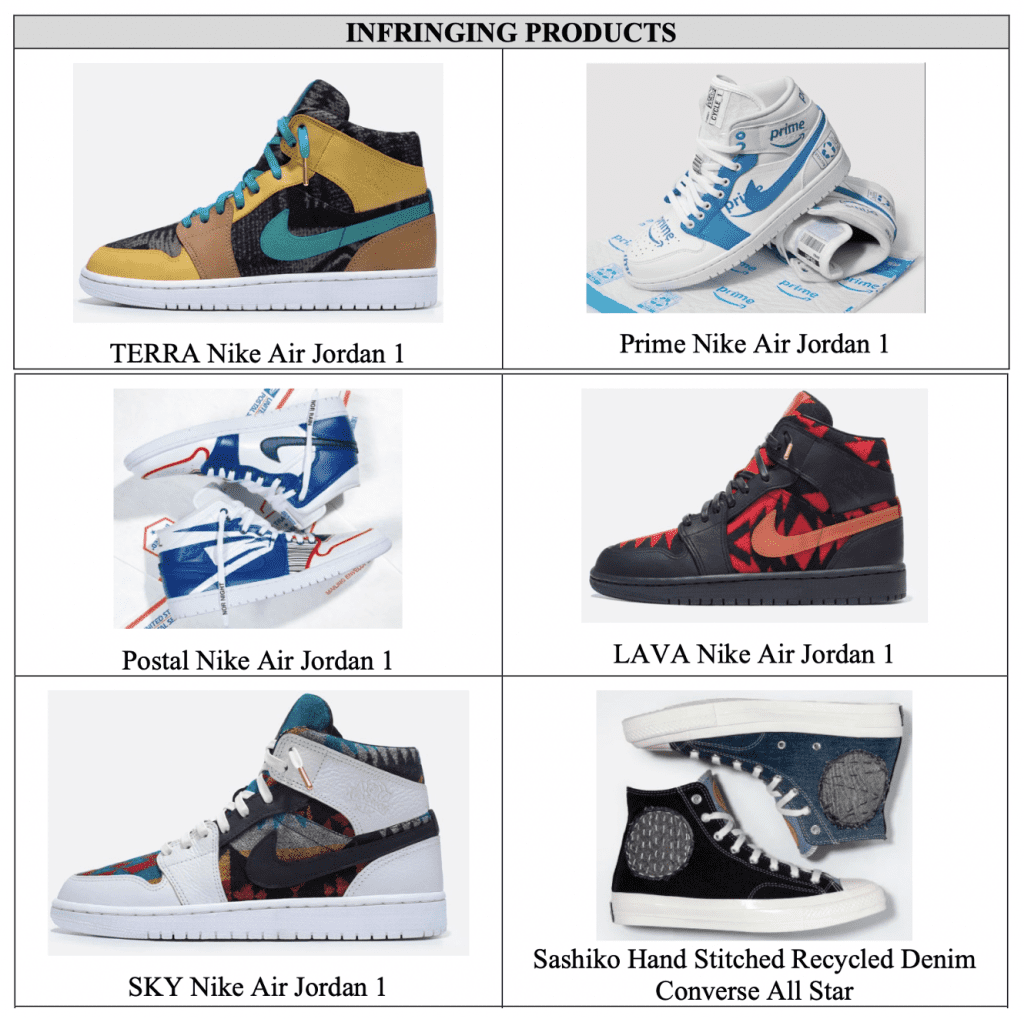Nike has settled one of the recent custom sneaker lawsuits that it initiated against a former employee and his company. According to a December 10 filing, Plaintiffs Nike and Converse and Defendants Jeffrey Waskowiak and KickRich, LLC have jointly alerted the court that they have entered into a confidential settlement agreement that calls for a final resolution of the trademark infringement and dilution case by way of a dismissal of Mr. Waskowiak as a defendant (without prejudice), and the entry of a consent judgment and permanent injunction that orders that remaining defendant KickRich permanently refrain from making any further unauthorized use of Nike and/or Converse’s trademarks going forward.
Specifically, in the December 10 motion that they filed with the U.S. District Court for the District of Oregon, the parties put forth a proposed judgment that orders that Nike and Nike, Inc.-owned Converse are “the exclusive owners” of an array of “valid and enforceable” trademarks (both registered marks and “related common law rights”), namely, Nike’s Air Jordan 1 trade dress and Dunk trade dress, including the respective outsole designs, and various word marks and logos, as well as Converse’s All Star trade dress and corresponding word and “design” marks. Beyond that, the proposed consent judgment and permanent injunction states that a judgment shall be entered against KickRich for infringing and diluting Nike and Converse’s trademarks, and for using false designations of origin through its practice of “promoting, offering for sale, and/or selling the products” bearing those marks.
With the foregoing in mind and in accordance with the parties’ settlement agreement, Nike and co. propose that a judgment be entered by the court against 2-year-old KickRich and any related entities in order to permanently enjoin them from manufacturing any products that make use of Nike and Converse trademarks that are “likely to cause confusion or to cause mistake or to deceive persons into the erroneous belief that any [KickRich’s] products … or any of KickRich’s commercial activities are sponsored or licensed, authorized by, or are connected or affiliated in some way with [Nike and Converse] or [their] trademarks,” among other things.

The caveat here, according to the proposed injunction, is that KickRich – which Waskowiak describes as a “boutique hand-crafted sneaker making business” – may “offer and promote customization services of genuine Nike and/or Converse products pursuant to the terms of the parties’ settlement agreement in this case.” Due to the confidential nature of the settlement, it is not clear what exactly KickRich is permitted to do when it comes to providing “customization services.” In my view, the settlement almost certainly strictly prohibits KickRich from customizing Nike and Converse sneakers to include third-party branding, such as the custom sneakers that make use of Amazon and the U.S. Postal Service’s trademarks, which are specifically cited in the complaint.
At the same time, there is a chance that the settlement terms otherwise enable Waskowiak’s company to alter the colorways of authentic Nike and Converse footwear, for instance, in order to alter them in a way that is not “material” and thus, would be permitted under the First Sale doctrine.
The proposed judgement and injunction, which need to be signed off on by Judge Stacie F. Beckerman of the U.S. District Court for the District of Oregon, come after Nike and Converse filed suit against Waskowiak and KickRich this summer, accusing them of trademark infringement and dilution in connection with their alleged pattern of “reselling Nike and Converse products that have been materially altered in ways that the brands have never approved or authorized,” and thereby, robbing Nike and Converse of their ability to “carefully manage which brands to collaborate with and thoughtfully select where, when, and how often their marks are used to guide the public perception for their iconic brands.”
In the complaint that they filed in a federal court in Oregon in July, Nike and Converse claimed that Waskowiak – who was employed by Nike as a footwear developer from 2014 to 2019 before starting his own company – and KickRich are on the hook for making “custom” footwear products that “combine purportedly genuine Nike shoe soles with uppers fabricated entirely by the defendants,” and that include “reproductions of Nike’s famous Swoosh design and other protected trade dress,” and then selling them for “hundreds or up to several thousand dollars each.”
Nike and Converse alleged that the defendants are in the business of acquiring genuine Nike and Converse footwear, such as Air Jordan 1 and Air Force 1 styles, as well as Converse’s Chuck Taylor All Stars, and then, “without [their] authorization, alter[ing] them in such a manner that [the shoes] constitute new, unauthorized products” over which Nike and Converse “have no control” even though their trademarks “remain intact” on the “custom” shoes. While these allegedly “customized” shoes “may use pieces of genuine Nike and Converse shoes,” the plaintiffs argued that the genuine parts are “so altered and combined with non-genuine parts or other brands’ logos that they can no longer be meaningfully considered Nike or Converse shoes.”
Not the only customs case on Nike’s plate at the moment, the Beaverton-based giant filed suit against Customs By Ilene, Inc., dba Drip Creationz this summer, alleging that the company is looking to unfairly trade-off of Nike’s successes by leveraging the value of Nike’s brand to traffic in fake products.” That case is still underway in a federal court in California.
The case is Nike, Inc. and Converse, Inc. v. Waskowiak and KickRich LLC, 3:21-cv-01068 (D.Or.)











